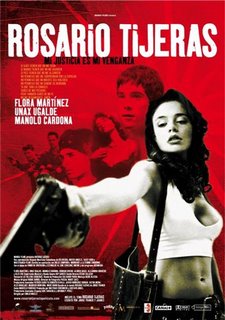 On leaving the auditorium last night we were encouraged to tear off the corner of the ballot paper we had been handed in order to rate the film. My vote said "Loved it!" and I did, on so many levels.
On leaving the auditorium last night we were encouraged to tear off the corner of the ballot paper we had been handed in order to rate the film. My vote said "Loved it!" and I did, on so many levels.After a blood-soaked opening sequence, the action rewinds to a scene where two rich boys in a familiar extrovert-introvert pairing are hanging out in a swanky joint called el Acuario in Medellín.
It's 1989 and the nightclub is split onto two levels. While coke-snorting mangazo Emilio is in his element downstairs, a single staircase leads up − oddly enough− to the seedy underworld of Colombia's narcos and their hitmen. On this night Rosario Tijeras is dancing in a sexy-solipsistic manner on the lower level, but moments after meeting Emilio's enthusiastic gaze she tumbles into lust with him.
It's not long before he wants to know her story, but she reassures him that what they have is beyond words...while she slowly develops a more candid emotional relationship with his quiet sidekick Antonio, played by the (rather obviously) Basque actor Unax Ugalde.
The damaged and damaging persona of Rosario emerges out of series of cinematic Chinese boxes. There are nested flashbacks and multiple views of different key scenes, similar to those in Amores Perros, justified here not by the coming together of different story strands, but rather by the rendition of a cleverly layered portrait, which prevents us from forming early on some of the more obvious prejudices that might surround this sort of female character. (It's worth waiting to find out how she acquired her 'scissors' nickname.)
In my view one has to judge narrative trickery like this in terms of whether it improves upon a more straightforward structure, and here I think it does. And as if to drive home the relevance of unconventional time to the film's meaning, towards the end Rosario gives us a tearful little speech about how she would like to have had the freedom to add more moments to the time she has already lived, in much the same way that musicians can proliferate notes within the standard beat.
An 'independent' woman in a violent, chauvinistic world, Rosario is delimited by the compromises she has had to make and the reputation that she now has to inhabit, and neither Emilio nor Antonio immediately realises that she might be seeking to unbind herself − if only a little − through her relationship with them. Emilio says he would follow her to hell. She later tells Antonio that he just never got it: she wanted to follow him to heaven.
Religious themes are never far from the surface here. We watch as Rosario blesses the bullets her brother Johnefe will use in his drive-by shootings by touching each one against a statuette of the Virgin. Later we see the hundreds of candles lit by killers around the larger statue of Nuestra Señora de los sicarios, Our Lady of the hitmen. There's a great little section in the middle when the recently deceased Johnefe is taken out partying in an open-top car by his parses, a fag hanging from his greyed lips and a pair of Aviators hiding his dead eyes.
Mexican director Emilio Maillé explained after the screening that he had initiallty intended to cast a lead actress with darker, more mestiza features, but when he saw Flora Martínez's screentest he knew he had found his Rosario. Her performance is absolutely first rate. It's perhaps only in the scenes where she has to reveal the innermost box, the simple, vulnerable young girl from the barrio, that her background in telenovelas might easily be guessed.
Maillé's use of the secondary cast is superb: every one, even if on screen for a few seconds or lurking in the background, has clearly been primed to contribute through action and gesture their own personal story to the overall mix. (Compare the other poker players in Casino Royale, if you can even remember them!) The extraordinary topology of Medellín is also used to good effect.
My favourite moment was close to the end. Antonio enters the re-named nightclub and spots Rosario on the dance floor, clenched by her former lover Ferney. Forever reticent, he takes a few steps back and looks away awkwardly...
Last night's London premiere came as part of the Discovering Latin America Film Festival, this year donating to CREA, a UK-based charity which seeks to ease Panama's campesinos out of their traditional yet increasingly unsustainable slash and burn agricultural practices.
There will be another showing at the Odeon Covent Garden next Saturday (2/12) at 11:30pm, perhaps followed by another opportunity to have a complimentary bottle of Corona with the director.
If you ring up the voice-activated ticket booking line be sure to pronounce the name of the film as Rozario Tidgeras.

No comments:
Post a Comment